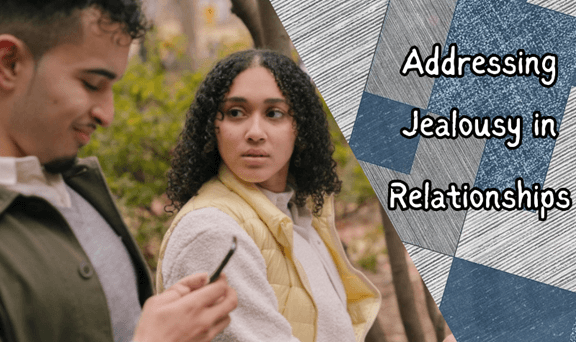Let’s address one of the most draining feelings in a relationship: Jealousy. Don’t take me wrong: it’s normal to feel a little possessive about your partner, but it can become a genuine pain when it becomes excessive. So, the issue is, how can you know whether a woman is jealous? That’s why I’m here with 8 Signs of Jealousy in a Woman to make things easier.
Possessiveness, an addiction to your phone, continuous allegations of cheating or lying, and an obvious lack of trust are all common signs of jealousy in a woman. However, based on a person and the scenario, jealousy can show itself in various ways.
Jealousy is a difficult emotion to handle. You may not even notice your partner is expressing jealousy toward you. It may initially seem harmless, but too much may harm your health.
However, if you detect the indicators early on, you can fix the condition before it worsens. An overly possessive partner is the last thing anybody wants to cope with. Now, let’s go a little more into the following signs of a jealous woman:
The Common Signs of Jealousy in a Woman

1. Changes in Communication:
Figuring out hidden signs of jealousy in women may be difficult. Changes in communication are one of the prominent indications. It might be a hint if she asks you additional questions about your hobbies.
She may be jealous when she exhibits discomfort when you hang out with others. Keep an eye out for growing sensitivity in her responses to how you interact with others, this might be a sign.
These changes in her communication style might be attributed to an underlying feeling of jealousy. Her emotions seem to be communicating with you via little signs.
Awareness of these alert signs enables you to handle discussions with empathy and understanding, promoting a healthy relationship where open communication may resolve problems and improve your bond.
2. Emotional Reactions:
Knowing a woman’s emotional responses, particularly signs of jealousy is like solving a jigsaw puzzle. As an early clue, look for frequent mood changes. If she seems irritated or frustrated for no apparent reason, it might be due to hidden feelings of jealousy. Also, take note if she displays dissatisfaction with what you’ve achieved.
These emotional reactions might be minor signs of something more serious going on. Consider it like a book with distinct feelings on each page; these responses are like chapters giving you an overview.
Be mindful of these signs to traverse the emotional terrain and encourage open conversation so both partners may communicate their emotions and understand one another.
3. Monitoring Behavior:
It’s like spotting little waves in a pond when recognizing signals of jealousy by behavior. Watch out for excessive social media monitoring, frequent checking might be a clue. If she begins asking for specific explanations regarding your whereabouts, she may be worried.
Unexpected presence at work or social gatherings may also signify jealousy. Consider it her attempt to better know your world. These actions may be motivated by a need for reassurance or a fear of losing contact.
Knowing these clues helps you tackle the problem with empathy, make honest discussions to address issues, and promote a healthy, trusting relationship.
4. Comparisons with Others:
Detecting jealousy often entails paying attention to how one compares its connection to others, similar to noticing patterns in a vivid mosaic. If she continuously compares your relationship to others, this might be a symptom of jealousy.
Feeling intimidated by your interactions with some people might also be a clue. Imagine some people to be jigsaw pieces that she is attempting to solve. Her behaviors may reflect this if she is dealing with thoughts of inadequacy.
These comparisons might act as a mirror, reflecting her fears. Awareness of these signs helps in open interactions, helping couples understand each other and build their unique connection. It’s like decoding the story behind the comparisons and constructing a narrative that leads to a deeper bond.
5. Physical Changes:

If you pay attention to the little changes, you might see jealousy clues like weather changes. Keep an eye out for changes in look or grooming habits, Jealousy can express itself in these bodily changes.
If you notice changes in her eating or sleeping habits, it might be due to underlying emotions. Consider these changes to be signals, a distinct language to express feelings.
Furthermore, an enhanced emphasis on physical fitness or attractiveness might be a reaction to jealousy. Call it her attempt to restore control or increase her self-esteem. Being aware of these bodily changes offers insight and assistance.
Less Common Signs of Jealousy

6. Sabotaging Relationships:
Detecting symptoms of jealousy in someone’s conduct is similar to deciphering secret signals, and paying attention to possible relationship damage is critical. If she tries to cause tension between you and your friends, this might be a symptom of underlying jealousy.
Just imagine she’s attempting to alter the rules of a game. Neglecting your relationships with family members may also be an effort to exercise control or soothe insecurity. She’s moving the pieces around like a puzzle maker.
Furthermore, trying to ruin your connections at work might be a method for her to express those buried feelings. knowing these warning flags is critical for sustaining successful relationships.
It’s like having a road plan to help you negotiate any obstacles, allowing for open discussion to resolve problems and build a relationship based on trust and compassion.
7. Compulsive Gift-Giving:
Signs of compulsive gift-giving may be seen via trends, similar to how she learns the beat of her favorite music. If she lavishes you with presents, it might be a technique for her to assert control or compensate for something. Another idea is to use these gifts to track your emotions or to test your loyalty.
Each gift is like a note, and she’s watching to see how the music develops. Expecting a certain reaction to the gifts given is equivalent to expecting the next section of the song.
Knowing about these gift-giving habits helps for open conversation. It’s like investigating the gifts’ origins, allowing both parties to express their sentiments, understand each other, and establish a bond of trust.
8. Self-Doubt Projection:
Spotting signs of self-doubt projection requires a sharp eye, much like reading an instruction written in invisible ink. It’s like throwing shadows on a beautiful day if she’s putting her own concerns onto the partnership. Accusing you of future cheating based on her own insecurities is like seeing her anxieties reflected in you.
She seems to be looking into a warped mirror. Another sign is a constant desire for assurance to ease self-doubt. Having an awareness of these actions is similar to owning a specialized decoder. It helps couples to discuss their thoughts, understand each other, and form a trusting, mutually understanding connection, like cracking a puzzle to unveil a lovely scene.
Real-Life Scenarios
1. Conversation Changes:
• Common Sign: She attempts to find out more about your schedule.
• Less Common Sign: Sudden uneasiness while spending time with people.
• Scenario: You see her becoming more interested in your day, but the major red flags increase when she shows concern when you spend time with others.
2. Emotional Responses:
• Common Sign: Irregular fluctuating moods.
• Less Common Sign: Unclear annoyance with specific items.
• Scenario: You are aware that her moods change often, but it becomes clear when she suddenly becomes irritated about things that have never troubled her before.
3. Observing Behavior:
• Common Sign: Frequent social media monitoring.
• Less Common Sign: Surprise visits at work or social gatherings.
• Scenario: While scrolling through your social media is normal, it gets troubling when she starts popping up surprisingly at areas you visit.
4. Comparisons with Others:
• Common Sign: Excessive comparison of your relationship to others.
• Less Common Sign: Having emotions of insufficiency
• Scenario: She constantly references other couples, but things change when she expresses fears about not fitting up.
These scenarios emphasize the significance of open communication. Discussing thoughts and worries helps both parties to have a better understanding of one another.
Trust is vital. Treating signs of jealousy requires building trust, assuring one another, and cooperating to enhance the partnership.
Addressing Jealousy in Relationships

Open communication is critical in relationships. It’s similar to having a heart-to-heart conversation in which you express your thoughts and listen to each other. This lets you better grasp what’s happening and establish a solid relationship.
Trust acts as an adhesive that ties partnerships together. You comfort each other to strengthen it. It’s the same as stating, “We’re both here for each other. This offers a secure environment for both parties.
Things may become complicated at times, and that’s all right. Seeking professional assistance, such as from a counselor, is similar to having a guide on your trip. They may help you handle obstacles and improve your connection.
Here are some strategies for dealing with jealousy:
• Be open and honest about your feelings. It’s like having a conversation in which everyone’s emotions are on the table.
• Join forces to accomplish activities that make you both happy. It’s like encouraging each other to be the best that you can be.
• Set ground rules that everyone can agree on. It’s like painting lines to illustrate what’s acceptable and what isn’t.
• Imagine what it’s like to be the other person. You can better encourage each other by putting yourself in their shoes.
Conclusion
That’s all my friends. I’ve discussed all possible signs of jealousy and their ways to overcome it.
Handling jealousy is similar to caring for a garden. It’s essential for a happy relationship. Partners may work together to cultivate a relationship based on trust, communication, and support by identifying and understanding these signs.
You need to understand and empathize with the other person to have a strong connection. Being supportive, transparent, and helping each other through hardships builds a long, loving relationship. A good relationship, after all, is a shared experience full of understanding, progress, and plenty of love. Thanks for reading, if you want to share a story or some advice, feel free to leave your comment below, but for now be safe and have fun.!


